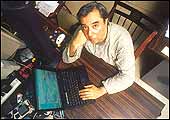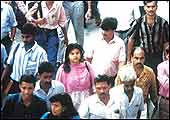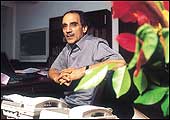








|
TRENDS:
TRENDS 2001
K-10 STOCKS: Nine
months after the Ketan Parekh scam rocked Dalal Street, K-10, the
favourite stocks of the man are once again on a roll. Their present price
points are still lower than their March 2000 peaks, but the Securities and
Exchange Board of India has already instructed stock exchanges to watch
them. It was in March this year that Parekh was arrested for defrauding
the Bank of India to the extent of Rs 130 crore. Parekh, one theory went,
had been funding his operation through the unique innovation of pay orders
not backed by cash or adequate credit. He is also alleged to have got
Madhavpura Mercantile Cooperative Bank to issue pay orders to him against
the very shares whose prices he was ramping up-another innovation since
pay orders are usually issued only against money paid upfront. The method
worked as long as the prices of the shares he held continued to escalate.
But when the NASDAQ crashed in April 2000, and the bears stepped in and
hammered down the prices of the K-10, he was caught in a bind.
-Roshni
Jayakar
KIDS: ...As
in CEO-Kids, and 2001 was a mixed year for the lot.
 ASHWIN MUTHIAH: The scion of the M.A.
Chidambaram group took over reins of flagship spic. However, for the
35-year-old Ashwin Muthiah, that has been the only piece of good news so
far-the debt-ridden spic's net profit fell 15 per cent in FY 2001. For
starters, he will have to spend more time at the spic's Chennai base
rather than in Singapore. ASHWIN MUTHIAH: The scion of the M.A.
Chidambaram group took over reins of flagship spic. However, for the
35-year-old Ashwin Muthiah, that has been the only piece of good news so
far-the debt-ridden spic's net profit fell 15 per cent in FY 2001. For
starters, he will have to spend more time at the spic's Chennai base
rather than in Singapore.
 SIDDHARTH LAL: The 28-year-old who
took over as CEO of Royal Enfield this year has an unenviable task. He has
to convert the great brand that is Bullet into some ready cash for Eicher.
Lal is planning to roll out four new models in the next two years and is
seeking to grow the Bullet family with branded accessories. Being a bike
freak could help. SIDDHARTH LAL: The 28-year-old who
took over as CEO of Royal Enfield this year has an unenviable task. He has
to convert the great brand that is Bullet into some ready cash for Eicher.
Lal is planning to roll out four new models in the next two years and is
seeking to grow the Bullet family with branded accessories. Being a bike
freak could help.
 DILIP MODI: He was a CEO at 24, but
this year, at 27, he faces an existential dilemma. Modi, who sees himself
as the quintessential telecom exec, found his business slipping away. He
sold his Kolkata circle to Mittal. And his operations in Karnataka and
Punjab could go soon too. A 10-year licence to operate cellular services
in Nepal might be a consolation. DILIP MODI: He was a CEO at 24, but
this year, at 27, he faces an existential dilemma. Modi, who sees himself
as the quintessential telecom exec, found his business slipping away. He
sold his Kolkata circle to Mittal. And his operations in Karnataka and
Punjab could go soon too. A 10-year licence to operate cellular services
in Nepal might be a consolation.
 SULAJJA FIRODIA-MOTWANI: Kinetic
decided to make the shift from non-geared scooters to bikes. Spearheading
this change was Firodia-Motwani who oversaw the launch of the Challenger,
which didn't do too well. In a second attempt, Kinetic is now launching
the GF 125 with Korea's Hyosoung. SULAJJA FIRODIA-MOTWANI: Kinetic
decided to make the shift from non-geared scooters to bikes. Spearheading
this change was Firodia-Motwani who oversaw the launch of the Challenger,
which didn't do too well. In a second attempt, Kinetic is now launching
the GF 125 with Korea's Hyosoung.
-T.R.
Vivek
LEGISLATION: When
five terrorists launched their daring assault on Parliament House, it
wasn't just an attack on the Indian State. They also blasted any hopes of
the passage of a slew of crucial economic legislation. As a result, in
2001, the government has only seven economic laws to show. There are 31
economic bills pending in the Lok Sabha and 39 in the Rajya Sabha. The
Budget session had been a complete washout with a deluge of
controversies-from Balco to l'affaire UTI. POTO (Prevention of Terrorism
Ordinance), Defence Minister George Fernandes' reinduction into the
Cabinet and the coffin scam had spelled finish to the winter session long
before December 13. Its sole contribution was the ratification of the
Companies (Amendment) Bill, which eased the norms relating to buyback of
shares.
Some productive work got done in the monsoon
session, which saw the passage of the Trade Unions (Amendment) Bill that
tightens registration norms for trade unions; the Protection of Plant
Varieties and Farmers' Right Bill, and the Foreign Trade (Development and
Regulation) Amendment Bill, which allows the levying of safeguard duties
in case of a surge in imports. Other Bills included the Chit Funds
(Amendment) Bill; the Taxation Laws (Amendment) Bill; the Electricity
Regulatory Commission (Amendment) Bill, and the Energy Conservation Bill.
One big failure for the government was the
Fiscal Responsibility and Budget Management Bill, the provisions of which
were drastically diluted by the standing committee.
Other Bills still languishing before various
standing committees are: The Banking Companies (Acquisition & Transfer
of Undertaking) Bill, which seeks to reduce government holding in banks to
33 per cent; the Electricity Bill, the Competition Bill, the Convergence
Bill, and two amendments to the Companies Act-one relating to bankruptcy
provisions and the other allowing manufacturing cooperatives to be
registered as companies.
-Seetha
MARKETS: Going
by its behaviour in 2001, Dalal Street should change its name to Skid Row.
The Bombay Stock Exchange (BSE) Sensex has dropped 683 points in 2001:
from 4,018.8 on January 2, to 3,335.8 on December 18, 2001. This, despite
net FII inflows into the market being the highest over the last three
years at $2.7 billion. Still, 2001 could have been worse: the index
dropped to 2,600-levels before recovering to 3,450. It was the stockmarket
scam of March 2001 and the trouble with the country's largest mutual fund-UTI-that
started the Sensex on its trip down south.
From 4,056.94, on March 8, the Sensex
plummeted as details of Ketan Parekh's machinations, and the extent of the
damage he had wreaked became available. Things continued to be bad in
April, and SEBI banned badla (carry-forward trading) and introduced
rolling settlement from July 2. Contrary to what most brokers had warned
would happen, share prices didn't collapse and the Sensex moved in a
narrow range between 3,100 and 3,350. Old economy favourites in the
cement, FMCG, petrochemicals, and pharmaceutical sectors became the market
movers. However, blue-chip information technology stocks like Infosys,
Wipro, and Satyam
Computer continued to elicit investor
interest.
It was 9-11 that exacerbated an already bad
year. The Sensex tumbled to touch its eight-year low of 2,594.87 on
September 21, 2001-a day when stockmarkets across the world touched a
nadir. Then came SEBI's announcement on trading futures in individual
stocks and a hint of optimism emerged. In November and December, the
Sensex has moved up 757 points to 3,335.8 (December 18, 2001), and the
rally has been led by K-10 stocks.
Volumes on Bombay Stock Exchange have shot up
from Rs 833 crore on September 1, 2001, to Rs 2,026 crore on December 13.
The most-heard whisper on the bourses concerns the return of Ketan Parekh.
That isn't surprising: the market has recovered at a time when economic
recovery still seems at least two or three quarters away.
-Roshni
Jayakar
 |
| Frooti:
forgotten... just like that |
MARKETING MILESTONES: There
was enough marketing activity in 2001 to make, well, Digen Verma happy.
Parle's teaser-driven campaign for Frooti helped the company relaunch the
brand, although some felt it ended up making the name Digen (short for
Digital Generation, according to some) more top-of-the-mind than the brand
itself.
While on the subject of relaunches, Hindustan
Lever relaunched most of its tea brands and Cadbury's did 5 Star and Gems.
And recognising that many Indian consumers use the same soap to clean body
and soul, sorry, hair, HLL extended its brand Breeze to Breeze
2-in-1-perhaps a first for any company that operates in the Rs 4,200-crore
soap market in the country. There were launches (as in just launches, not
relaunches) too: eight new car brands hit Indian roads in 2001, with the
Fiat Palio (1.2) at the low-end and the Mercedes C-Class at the other
extreme. And the quest for profitable niches continued: with Titan and
Timex's emphasis on a steel range (Rs 1,250-7,000) to Madura Garments'
launch of a premium garment brand, Sartorial.
However, the lead story of 2001 was the
continuing focus of companies on promotions: across product categories and
market segments, companies wooed diffident consumers with in-your-face
offers.
-Shailesh
Dobhal
NEWS MAKERS
 ANIL AGARWAL ANIL AGARWAL
The Sterlite chairman's Balco blues ended after 67 days, with the workers
returning to the Korba plant. Soon after, SEBI found Sterlite guilty of
participating in a 1998 Harshad Mehta-led foray to ramp up its stock
price.
 SUNIL MITTAL SUNIL MITTAL
Amid raging controversies, Bharti's charismatic CEO emerged as the Czar of
the Indian cellular business after bagging the licence to be the fourth
operator in eight of the most lucrative circles in the country.
 VENU SRINIVASAN VENU SRINIVASAN
Venu 'moped King' Srinivasan terminated TVS Suzuki's 15 year old jv and in
the process pulled off a coup of sorts-buying out the Suzuki Motors' 25.97
per cent stake at just Rs 15 per share.
 EKTA KAPOOR EKTA KAPOOR
The 25-year-old creative director of Balaji Telefilms may be producing
stereotype family soaps that often start with 'K' but that hasn't stopped
her from being the high priestess of TV ratings this year.
-T.R.
Vivek
NGOS: Two
non-governmental organisations, the Chennai-based M.S. Swaminathan
Research Foundation (MSSRF) and the Delhi-based Development Alternatives
bagged the prestigious Stockholm Challenge award, for the usage of it for
rural empowerment this year.
 |
| ASHOK KHOSLA:
all fame, no profits |
MSSRF's experiment in 12 villages of
Pondicherry uses a hub-and-spokes model of data-cum-voice communication
within the villages to bridge the digital divide. The website
www.mssrf.org has location specific information and also dynamic
information on development programmes of the government, weather
information for the fishermen, and topical inputs for the farmers. The
villagers access information through the internet from the knowledge
centres, which are managed by local women. Access is free and a population
of nearly 10,000 benefits from the effort. ''We provide only the
technology and ask the communities to sustain the project,'' says
Swaminathan. Former Harvard physicist, Ashok Khosla's tarahaat uses a
similar dotcom model for empowering rural communities in Bundelkhand and
Punjab. tarakendras akin to Swaminathan's knowledge centres are run by
young local entrepreneurs on a commercial basis. Another NGO that hit the
headlines this year was Anil Agrawal's Centre for Science and Environment
(CSE). For the last two years CSE has been Delhi's CNG-crusader. In
November it came out with a ''Green Rating'' for automobile companies in
India. The report earned the wrath of virtually every auto maker as it
indicted most for not being up to the mark when it came to environmental
standards. Still, it's all in a good cause.
-T.R.
Vivek
NPA: If
there is one thing 2001 will be remembered for-not very fondly, though-it
is the virtual collapse of the Indian financial system.
That the NPA (non-performing asset) cancer
was eating into the very vitals of the FIs-courtesy, poor appraisal of
reports, asset-liability mismatch, and high cost of borrowing-was
generally known, but the real extent of the damage only became evident
when IFCI failed to honour its interest payment obligations on Rs 220
crore worth of bonds in July 15 this year. Things came to a head when the
institution was put on a rating watch for a possible downgrade by three
credit agencies-Fitch, Moody's and ICRA-within a span of three days.
The details: IFCI's net NPA's have increased
from 20.04 per cent in 1997-98 to 21.49 per cent in 2000-01; and even
these figures are been disputed by the Reserve Bank of India which claims
that IFCI's actual net NPA is much higher at 32.36 per cent. The
government has sought to gloss things over by working out a Rs 1,000 crore
lifeline for IFCI; Rs 600 crore of this will come from its major
shareholders: Industrial Development Bank of India (IDBI), State Bank of
India, Life Insurance Corporation of India, and General Insurance
Corporation of India. The catch? The share of IDBI, which has 31.71 per
cent stake in IFCI, works out to Rs 200 crore. With non-performing assets
of 14.8 per cent, such infusion will mean IDBI has to make additional
provisions in its balance sheets. Now, it is IDBI's turn to ask for a
relief package.
-Ashish
Gupta
OLD ECONOMY: With
the dotbomb blowing up and tech companies hitting the brakes, stodgy
old-economy companies were back in favour. Investors on Dalal Street
scurried for safety in old economy stocks in a bid to escape the software
fallout. High on their pecking list were pharma companies like Dr Reddy's
Lab, Cipla, and Ranbaxy, and some select cement manufacturers like Gujarat
Ambuja and acc. The recession-proof Hindustan Lever was hot too. And in
auto, Hero Honda and Bajaj Auto rode up. That did not mean cul de sac for
top software scrips. Infosys and Wipro kept investor interest alive,
thanks to their strong fundamentals and above-average returns. In fact,
towards the end of the year, even the second-rung software stocks had
started moving up.
|
OLD
TRIUMPHS |
| COMPANY |
MARKET CAP |
| HLL |
47,799.06 |
| RIL |
32,787.74 |
| SBI |
9,939.18 |
| DR
REDDY'S |
2,998.51 |
| HERO
HONDA |
4,923.60 |
| GUJRAT
AMBUJA |
2,998.51 |
With the economy slowing down, the more
aggressive old economy majors took to spring cleaning with a vengeance.
Manufacturing processes were put under the lens, as were headcounts. Even
traditionally benevolent employers like Tata Engineering and Bajaj Auto
retired surplus labour. Still, potential employees looked at manufacturing
companies with a new-found respect, simply because of their more stable
business models. All in all, 2001 was when sanity returned to the
hype-struck investors.
-Roshni
Jayakar
 |
| CROWD: a
billion and counting |
POPULATION: Here's
what happened on the population front: India added another Australia (2
crore people) in just 365 days. The latest tally? 1,027,015,247. Scary?
You bet. So, what is India doing about it. On paper, there is a Family
Planning scheme. The only hitch is that it doesn't seem to be working.
Sure, there's been some improvement. Where the country had 40 children
being born per 1,000 of population every year, the rate has now slowed to
25. But achieving the target of 21 children by 2010, seems near
impossible.
Some states like Kerala have managed their
family planning programmes fairly well, lowering fertility rates to 2.1
per couple. But other states like Uttar Pradesh, Madhya Pradesh, Bihar,
Rajasthan, Orissa, Chattisgarh, Uttaranchal, and Jharkhand, which account
for 48 per cent of the country's population have made no progress. ''There
is no dearth of funds, but the states have to be motivated,'' says C.P.
Thakur, Union Minister for Health and Family Welfare. If they don't,
India's population by 2005, will soar to 1,085,455,000. Think about it.
-Vinod
Mahanta
 |
| ARUN SHOURIE:
private i(nvestment) |
PRIVATISATION: If
there's one minister in Team Vajpayee who'll be ending the year in good
cheer, it is Disinvestment Minister Arun Shourie. The privatisation bus
he's been driving for just about a year is coasting along merrily, after a
series of false starts. Shourie and his D-company have privatised three
companies and eight hotels this calendar year, netting Rs 997.24 crore for
the government coffers (of which Rs 551.5 crore actually belongs to the
last fiscal ending March 2001). It may be far short of the government's
disinvestment target of Rs 12,000 crore, yet nobody is sneezing at
Shourie's feat, considering that the government had only the privatisation
of Modern Foods to show for the whole of 2000.
Here's a quick look at Shourie's
disinvestment report card:
February 2001:
51 per cent stake in Balco sold to Sterlite Industries for Rs 551.5 crore.
October 2001:
51 per cent stake in CMC sold to Tata Sons for Rs 152 crore.
74 per cent stake in Hindustan Teleprinters
Ltd (HTL) sold to Himachal Futuristic Communication Ltd for Rs 74 crore.
November 2001:
Two Hotel Corporation of India hotels sold for 159.51 crore-Juhu Centaur
for Rs 153 crore to the Ajit Kerkar-promoted Tulip Co. and Centaur Rajgir
at Rajgir to Inpac Travels India for Rs 6.51 crore.
Six of eight ITDC hotels were sold for Rs
60.23 crore.
Sure, Shourie had his share of failures as
well. Hindustan Zinc didn't get sold because of some pollution-related
issues. Nor did the prime Ashoka Hotel, Delhi, reportedly because the
asking price was too high. But the minister is confident that he will get
some big ticket privatisations (like IBP and IPCL) out of the way before
the end of this fiscal. That's one man in a hurry.
-Seetha
1
|
2
|
3
|
4
|
5
|

![]()
